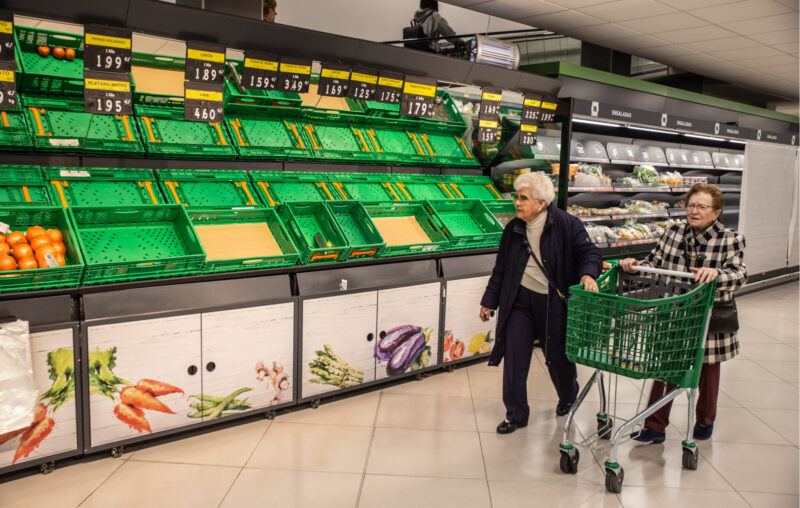Deeply Impacting the Economy

When consumer wants or conditions of the world suddenly change, we want an economic system that rapidly shifts with it.
When toilet paper is all of a sudden demanded in troves, we want toilet paper producers to receive that message and quickly ramp up production. When hospitals in the early stages of the pandemic cried for a lack of ventilators, what we required of our market societies was that well-positioned producers shift production to fulfill that demand. When the use of hand sanitizers and face masks skyrocketed in March and April, it was a good thing that prices initially spiked, such that car companies, Vodka producers, and perfume manufacturers shifted their supply lines to make more of the things we now desperately wanted. We overturned the mad urge to obliterate plastic, and intentionally kept chairs and tables empty – not because our previous decisions had no value, but because something else was now more important.
While the last six months of corona panics, lockdowns, trade disruption, loss of liberty and unprecedented GDP declines might have been turbulent times, they are still nothing compared to the disaster facing Earth in the 1998 movie Deep Impact. Not even the alleged disaster that extremist green movements like Britain’s Extinction Rebellion desperately warn against measures up to the swiftness and (thankfully) fictional devastation that director Mimi Leder depicted on screen.
Admittedly, the comet rushing towards Earth in Deep Impact is a very different beast than climate change, but the connection has been made before. At one point in Bjørn Lomborg’s book on environmentalism’s scientific claims, False Alarm: How Climate Change Panic Costs Us Trillions, Hurts the Poor, and Fails to Fix the Planet, he wrote:
“[Climate change] is not like a huge asteroid hurtling toward earth, where we need to stop everything else and mobilize the entire global economy to ward off the end of the world.”
Watching Deep Impact today might thus give us some solace that however bad things seem in 2020 – from a corona perspective or a largely overblown climate-apocalypse perspective – at least they are not that bad.
In contrast to climate change, the comet rushing towards Earth in the movie is a concrete, close to certain eradication of most human life, on short notice. The climate threat is the opposite of all those: it represents slow, minor changes, with ample time for adjustment, a close to certain survival for humans (admittedly with some ecosystems and weather phenomena operating differently than they did in the past), over a very long time frame. The damages to humans from a changing climate, if they will ever amount to much, are probably decades down the line (climate-related natural disasters already kill fewer and fewer people each year, and we produce more food than ever before, trends that even the worst climate scenarios will have a hard time overturning).
What’s even more disturbing in the movie is that none of our production lines adjust to this new imminent disaster. The U.S. government, upon announcing the threat to the world, freezes all prices and wages. President Beck, stoically played by Morgan Freeman, reveals solemnly that there will be no hoarding and no profiteering:
“Our society will continue as normal. Work will go on. You will pay your bills. There will be no hoarding; there will be no sudden profiteering. I’m freezing all wages, and all prices. What a bottle of water cost you yesterday, it will cost you tomorrow.”
Let’s just abstract away from the feasibility of this: The President of the United States does not have that kind of authority, and even if (s)he had, there would be no way to enforce it. And I’d be shocked if people would keep on transacting like they always had, at yesterday’s prices, knowing what they know now about their imminent future.
But let’s say it’s possible to somehow police all the millions and millions of market prices and hundreds of billions of transactions every year – what about quantities? Is the government, intoxicated under its own god complex, to ensure that the same number of cars, water bottles, stuffed teddy bears and oil rigs are produced, sold, and purchased as last year? And if not, don’t you think that some of those items might warrant (and even fetch) different prices now?
At the moment of President Beck’s announcement, information is released globally that changes the wants, values, and priorities of every human being – and changes the conditions for producing things. We have all these inherited production lines, aimed at fruition several years into the future; those are now obsolete and close to worthless. What we want is for a resilient and flexible market system to rearrange capital goods to produce consumer goods that are now most valued. Perhaps some people might engage in producing whatever we’ll need after the comet’s impact – on the off chance that some of us survive – but most of our resources need to be seriously reallocated to other ends.
What we want and desperately need is profiteering: we need companies producing the wrong things to go bankrupt and be taken over by those that produce the right things – things that we now urgently want instead. We need asset prices to adjust so we can move capital goods from obsolete lines of production into whatever people want with only a year left to live. If there is a chance we survive – which many in the movie do – we want to produce the equipment we need to weather the literal storm, purify the air to breathe, or ensure we have food in storage to ride out the loss of food production.
Not unlike the corona scramble of 2020, though of course on a much bigger scale.
A lot of assets, aimed at prospecting for oil or designing iPhones or building Teslas or next-generation Boeing planes, would be completely worthless. We quickly and suddenly want to switch machines, manpower, and knowledge from those lines of production into canned food, hazmat suits, breathing equipment, new homes away from the oceans and on high ground and all the other adjustments that a free society would embark on.
This is the most appropriate cinematic illustration of what our real world’s climate movements have in mind when they talk about fossil fuel companies holding (zero-value) “stranded assets” – assets that used to be valuable but no longer are (or should be). In a Deep Impact scenario, they need to go to zero, and be redeployed for more valuable ends.
Instead, the American government engages in a NASA-style plan to blow the comet off course and otherwise pretend that nothing has changed. Even forcing nothing to economically change – except that everything has changed. In his address, Beck declares martial law and imposes curfews and restrictions on freedoms not entirely unlike what many Americans, New Zealanders, and Australians have experienced in the handling of our own recent disaster.
While the actions of many governments during corona left much to be desired, at least they didn’t engage in anything remotely as foolish as Beck’s administration. Prices and quantities were mostly free to adjust, effectively channeling resources into lines of production now suddenly more valuable. While central banks and treasuries showered economies and financial markets with goodies, at least the price system was still somewhat intact: masks and hand sanitizers and ventilators and everything else we now think we need could efficiently be produced.
When the world suddenly changes, we want an economic system that adjusts and reflects our updated knowledge and desires. That requires prices to move, quantities to change, bankruptcies to occur and a whole lot of profiteering – whether in our world or in fictional worlds.










